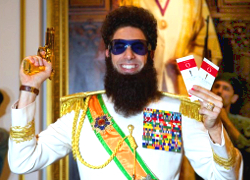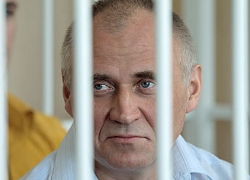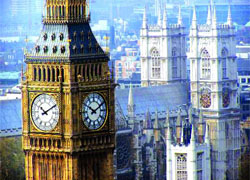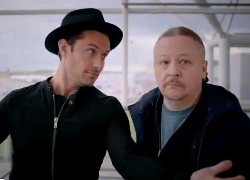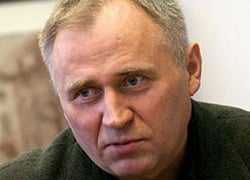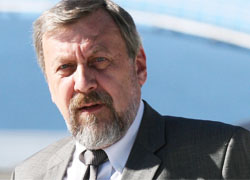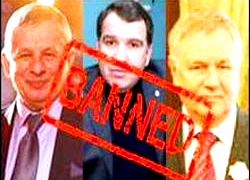 The dictator will continue to ignore the West’s demands unless billions of dollars stop coming in.
The dictator will continue to ignore the West’s demands unless billions of dollars stop coming in.
The chair of the working group on investments at the Committee for
International Control of the Human Rights Situation in Belarus
Olga Zakharova said it in an interview to
charter97.org. Olga has recently presented report The EU Dilemma: "What Kind of Dialogue with Belarus?" in Warsaw together with
Yuri Dzhibladze.
-
Olga, you became known as the chair of the Committee for International
Control of the Human Rights Situation in Belarus first after the events
of December 19, 2010 in Minsk. How did you become a human rights
activist?
- My mother was born in Latvia, but she came to
Russia to study, and stayed to live here. At first I was a biologist, or
an environmental activist with a background in journalism. But
eventually in the late 1990-early 2000s many of my colleagues from
former soviet countries were put to prison. In Belarus, it happened to
professor
Yuri Bandazhevski; in Turkmenistan several people were
pressed and had to leave the country. And here in Russia it became much
harder to protect the environment, tress, people from the factories. The
space squeezed and I realized that unless basic human rights are
respected, there’ll be no environment. Belarus, Russia and Central Asia
are gradually moving away from democracy, and I decided that I should
work with human rights.
- When did you as a Russian human rights activist begin to work with the situation with human rights in Belarus?
-
At first, it was the environment. Apart from Bandazhevski and all those
“nuclear” cases, we worked with protection of the Bielavezhskaya
pushcha. When the current powers got involved, we tried to preserve the
national park, to save at least something. We held a successful
international campaign that drew much attention, but eventually the
ecologists had to leave. Then I was warned that it would be better for
me not to return to Belarus.
But we did return on December 19, 2010. It was an international task to rescue the Belarusians that
had to go to prison after the presidential elections.
We should show solidarity. There is a law: if you don’t help others,
nobody will help you. We realized that the same or a similar situation
can happen in Russia. In fact, we were right…
- Thank you for your solidarity. How did your work look like at that time when so many people were in prison?
-
At that time, a part of representatives of the Committee for
International Control of the Human Rights Situation in Belarus were in
Minsk working with youth at human rights seminars. Before the elections
of December 19, 2010, we saw that someone had to watch and tell about
the events to the international community. We kept in touch and started
to act before the mass arrests. My colleagues and I had this idea to
start the OSCE Moscow process, while the others who were in Minsk wanted
to launch an observatory mission to tell about what was going on.
It
became clear that still so many organizations alarmed by the situation
in Belarus are looking for ways to help, there was a need to establish
the committee, first of all, because the committee gives the possibility
to coordinate actions. As a result, apart from the international
observatory mission of the Committee for international control of the
situation there was appointed Special Rapporteur on Belarus
Neil Jarman
whose report was very influential. It was the first appointment of a
special rapporteur on Belarus since the events of December 19. His
report was one of the factors that helped us start the OSCE Moscow
process. We had to convince everyone that this was an extraordinary
situation.
Even if the terror had never followed – the tortures in
prisons, forced disappearances – this situation would still be
classified as a “crisis”.
For a long time our mission was in fact
the only international institution functioning in Minsk, because the
OSCE mission was very soon asked to leave. It was basically the only
source of information, and as soon as the Belarusian powers realized it
they started to bar human rights activists from Russia and Ukraine from
coming to the country. Our colleagues were stopped at the border; some
were detained, some were deported or asked to leave Belarus within the
nearest 24 hours and not to come back in the near future. This way, 20
persons were forced to leave Belarus, that not including the foreign
journalists and activists of political movements. I am only talking
about civil observers not related to political forces who only worked
with human rights.
- You have mentioned a crisis. Is it over or is it still happening?
- In his
report, the UN special rapporteur on Belarus Miklos Haraszti
emphasized that
we are dealing with a full-scale system crisis of human
rights in Belarus. It reached its acute on December 19, 2010. A system
crisis is not a fantasy. The European court of human rights has a
definition for it. The situation in Belarus fits it perfectly.
Why
is it important? We are looking at situations not only from the point
of view of personal tragedies and broken lives, but we also consider the
current events in Belarus and now in Russia. It is an attempt to
rewrite the history of human rights, to give the powers right to do
whatever they please. And if our rulers succeed, we will get a new
frightening world. Syria will seem a paradise compared to what will
happen here. It is already happening in several countries in Central
Asia, but nobody is talking about it.
- How strong is the impact of the situation in Belarus on its neighbors – Russia and Ukraine?
-
The impact on Russia is negative. For the last 20 years, a part of the
nation has been living in an illusion that there is some kind of
communist paradise across the border. Many people believe that there is
this ideal model, “Byelorussia” as they call it. And it has a
destructive effect not only on common people but on the intelligentsia,
teachers, doctors who are not particularly interested in details and
don’t have the full picture.
Unfortunately, Lukashenka’s propaganda has
proved very effective.
But the events after December 19, 2010,
showed that the Belarusian powers can throw people to prison and torture
them and not suffer any consequences. Sanctions? Conflict with the
West? Well, there has always been a conflict. Then repressive laws
followed. Belarus is a training ground. Lukashenko tries first, Big
Brother repeats.
As for Ukraine, it will manage to keep balance
unless the situation changes. The relations of Belarus with the European
Union also play a role here. If the EU repeats the same mistake and
says “it doesn’t matter that you have political prisoners and no
democracy – just fix something a little bit,” Yanukovich and his team
will realize that these methods can be used in Ukraine. And they will
have it their way, the Eastern Partnership will just play along.
If
the EU becomes more rigid (which is not so probable), there is a chance
that the Ukrainian powers will act more properly. Obviously, neither
Lukashenka, nor Yanukovich want to hug with Russia, and because both of
them will lose their power at once.
I am going to say a very cynical thing. Everyone is anxious about
the rising Russian military presence in Belarus.
Why is Lukashenka doing it? He understands that nobody will perform a
military overturn. This military base poses no threat to him. If the
situation develops in the same direction, Putin will gain unlimited
authority.
- Why are you so sure?
- There are norms
of the international law. Russia will never choose a military overturn.
The only thing Russia could complete was the little victorious war in
Georgia. Hence, nobody will deprive Lukashenka of his power in a
military overturn.
If Russians get a full control over the Belarusian
economy, there is no need in Lukashenko. Then he can be simply removed
and placed in Drazdy.
As any paranoid, Lukashenko feels danger 100
steps away. Our forecast is that he will stay till the last drop in his
games with Russia.
On the other hand, Lukashenko will try to
“suppress” the European Union. And it would be really stupid to tell the
Europeans (while export of Belarusian goods to Europe reduced by 40
percent during January-June 2013) to lift the sanctions against the
dictator, which is already happening.
This person just like his entire team come from the Soviet Union. They
don’t understand what a constructive dialog
is. For them, it is a situation when the opposite part makes
concessions and when the system of agreements, constraints and
counterweights doesn’t function.
Europeans can spend all time at a chess
board, but Lukashenka will still beat them with a hockey-stick.
- What should Europe do? What are your recommendations?
-
The system needs to change. Why don’t we support the international
procedures that concern Belarus? Why did we need the OSCE Moscow
mechanism so much? Why do we support the report of the UN special
rapporteur Miklos Haraszti and why do we want his mandate prolonged?
Because all these things put the situation in Belarus in a legal sphere.
You see, this ”dialog” with the EU
about human rights, the ”dialog” with the USA is an invention of evil
persons from the West who want to ”bend” the little poor country over.
And when we appeal to the international legal norms, agreements and
obligations that Belarus took on voluntarily, it proves that human
rights are not an interior issue. If you want a dialog, you should
fulfill your obligations, not act as little children at the dinner
table: I’m not eating this, I’ll have that instead.
With these
agreements, commonly accepted notions and norms, a road map of changes
can be constructed to use for evaluation of the progress. If the
political prisoners are released now (and in the current situation they will not be rehabilitated), there should be no illusions.
If
there are no clear changes, there will be new political prisoners. Why is
this situation so repulsive?
Because the ruler says he acts in
compliance with the law, that Belarus is a state of law. But if this law
contradicts all international norms and agreements on human rights, it
means that it is a bad law and it should be changed. There is no need
for claiming hypocritically “we live in a state of law.”
- Do you support target sanctions against Lukashenko’s regime?
-
It is not sanctions but restrictive measures, because sanctions are
“carpet bombing”. We are talking about the need to limit the trade
between
the people who earn profits for Lukashenka’s regime and, first of all, the USA and EU.
A classic example: Latvia managed to lift these restrictive measures from some of the most profitable companies of Yury Chyzh.
Basically, these companies worked via the profitable scheme of
petroleum products trade estimated to generate 2-3 billion dollars.
Do
you see now why Lukashenka ignores the demands of the international
community? When the positive trade balance with the EU equals 8 billion,
all threats sound ridiculous. It is much more than what they get from
Russia.
That is why we believe that those who earn profits for the
regime should face significant restrictions. The criteria are simple:
we see who gets the best parts, and who gets license to trade with
petroleum products, tobacco and alcohol.
- You have studied the situation with the Belarusian banks, too.
-
This situation is interesting. We have questions about Iranian banks in
Belarus, although formally sold because of the sanctions imposed by the
USA. But the question of how and where the cash flows went remains,
because we know that Belarus and Iran have a mutual agreement on direct
accounting that doesn’t involve SWIFT.
But you understand that these
accounts are meant for direct deals of unknown character.
100
percent of shares of the North European Bank until recently called
Onerbank belonged to Iranian banks. After the sanctions imposed by the
West, the bank had to change its name and shareholders. Now, its owners
are citizens of Germany and Turkmenistan. However, there are born
Iranians among the board members.
T
here is Fransabank with
Lebanese capital that operates in France, Lebanon and, I believe, Syria.
For a couple of years ago, the New York court closed a case against
this bank initiated on complaints of the victims of attacks against
Israel, like Hezbollah attacks. The bank worked with accounts of this
organization. There was enough evidence for the case, but it was still
closed because the court lacked jurisdiction. Here comes a question:
what does this bank do in Belarus, given the complicated history of
Lukashenka’s weapon trade with all these friendly regimes in the Middle
East? In my view, this situation should be scrutinized.
-
Lukashenka’s prime income is from selling petroleum products to the
West. There is a long-lasting argument: if this trade is limited, who
will suffer – Lukashenka or the people?
- There are two
aspects to this argument, a moral and a practical. The moral aspect:
when the regime gets its key income from selling Russian petroleum
products, the EU can follow the example of the USA and simply impose
sanctions against Belneftekhim. But unfortunately, Europeans won’t dare
do that.
Moreover, they claim that the petroleum products mostly are
transit goods. Then another question arises: where do these goods go to
from Rotterdam? Maybe, the USA? This question should also be considered.
The
practical aspect: restrictions of the petroleum products trade are
needed at least for private companies, like it was with Chyzh’ companies
which had a major impact on the regime But as we see today sanctions
have been lifted from all these companies.
- Why is it happening?
-
You surely understand that when some countries get the major part of
their income from transit of goods, there comes a necessity, as they
think, to
”compromise” and ”use a pragmatic approach”. And hence, if voters are discontent with the economic situation in the country, lobbyists’ job gets easier. Basically,
charter97.org has published reports of security services of Latvia and Lithuania that said that the
Belarusian special services are very active in these countries.
We have an idea about what they do there.
During a KGB meeting
Lukashenka suddenly asked, what happens with this dialog with the West,
which shows who is actually in charge of this “dialog”.

